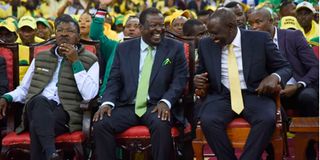Coalition parties and the challenge of accountability

From left: Ford Kenya party leader Moses Wetangula, ANC party leader Musalia Mudavadi and Deputy President William Ruto at Kasarani Sports Centre in Nairobi on March 15, 2022 during UDA National Delegates Conference.
What you need to know:
- Parties officially form coalitions by signing written agreements and sharing these with the Registrar for Political Parties.
- A coalition party can therefore only be valid if it has the endorsement of the various parties’ governing organs.
A coalition party comes into being when independent political parties sign an agreement to pursue a shared goal. These coalitions are usually formed before elections and are primarily aimed at fielding joint presidential candidates.
Coalitions can still be formed after elections to pursue shared ideals, especially by outfits outside power seeking to form a strong opposition. In general, coalition parties enable political entities to choose who their partners will be, why they should partner and how.
Parties officially form coalitions by signing written agreements and sharing these with the Registrar for Political Parties.
The agreements detail their operational rules, power-sharing modalities, policy decisions and more. A coalition party can therefore only be valid if it has the endorsement of the various parties’ governing organs. The documents must be signed by nationally accepted and recognised officials, and certified by recognised commissioners for oaths.
Coalitions also present a great rebranding opportunity for politicians, with millions being spent on names, colours, logos, merchandise and roadshows.
A coalition party, however, faces serious challenges when political accountability is put on the table. This is because, essentially, a coalition is like a group. If the group promises something, only the group can be questioned on how to deliver it. But what happens if the group is dissolved?
Campaign promises
If a political coalition makes campaign promises, who is supposed to keep them? How can the public be sure the promises will be kept, especially because people can only belong officially to parties and not to coalitions? And where opposition outfits join ruling parties and vice versa, how can the track record of an individual party remain clear?
There should be a coalition task force at the party level tasked specifically with public accountability. Such a task force can follow up on task allocation to specific parties.
Additionally, coalitions should not be allowed to just fade away once they are dissolved, especially if they were voted into power or their members came together to form the opposition.
The Registrar of Political Parties should be mandated to announce through the media the dissolution of coalition parties.
The parties themselves should inform the public whether they intend to follow through previous promises, or whether they plan to engage with matters in a new way upon dissolution of a coalition.
True, coalition parties have made Kenyan politics interesting and refreshing, but this should not be at the expense of public accountability with regard to campaign promises. It is thus imperative that mechanisms be put in place to ensure coalition parties are accountable to the public on campaign promises. This way, they will help in strengthening democracy in Kenya.
The writer is a policy analyst. [email protected]





